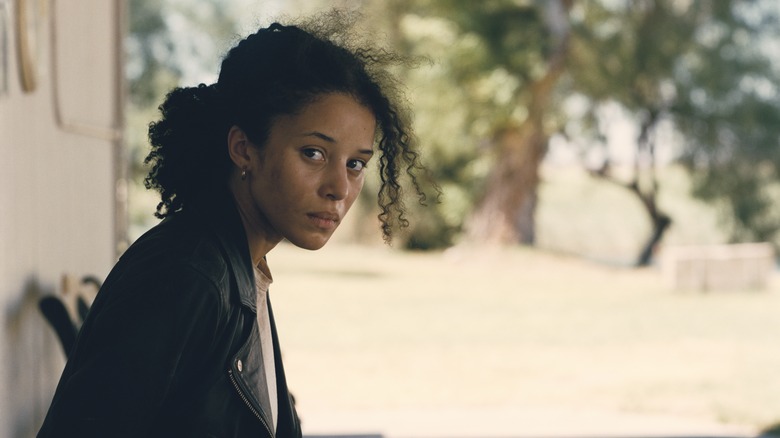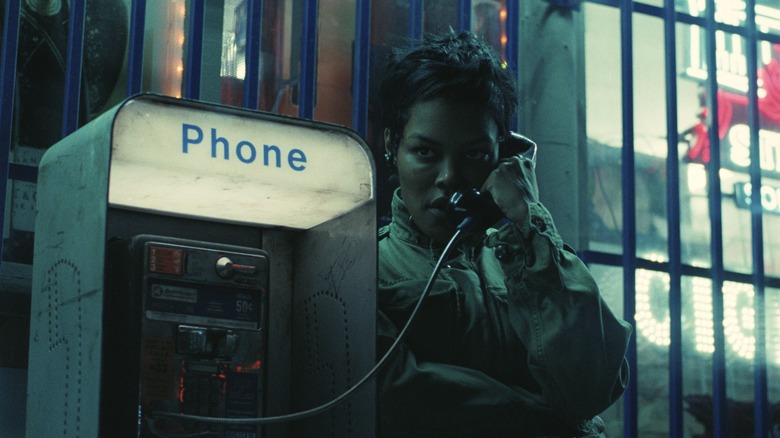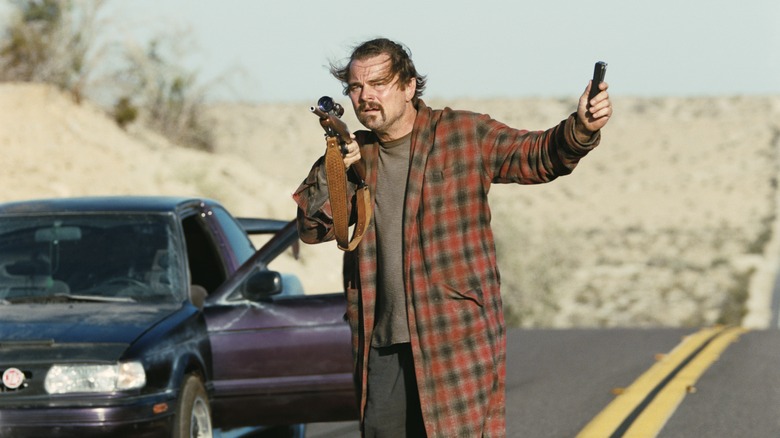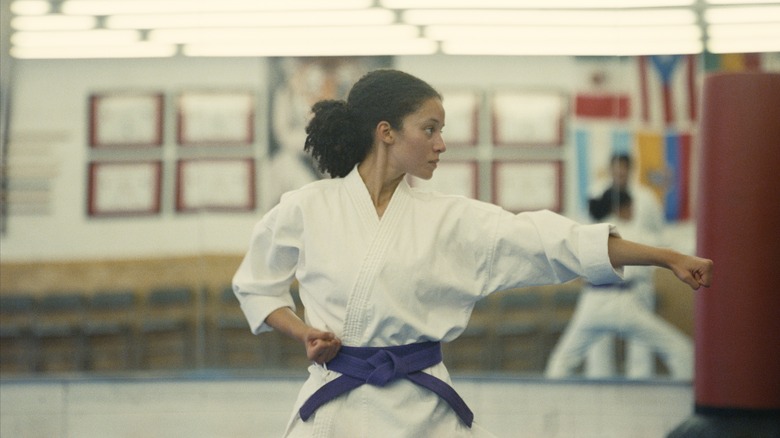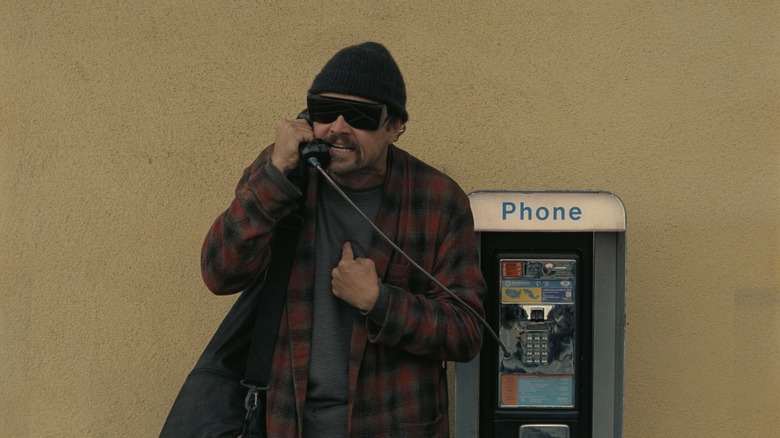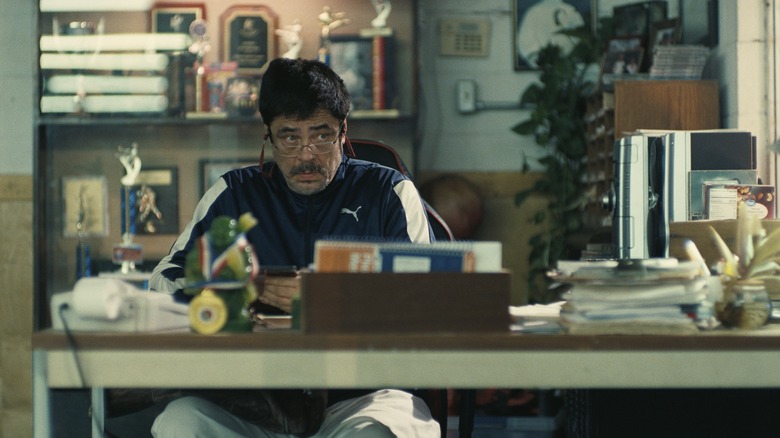The Ending Of One Battle After Another, Explained
¡Viva la revolución! Be warned, this article contains major spoilers for "One Battle After Another."
You could easily describe the films of writer/director Paul Thomas Anderson as "eclectic." There are throughlines, of course — inner lives, flawed characters, complex relationships. Many draw their essence from a specific time and place, making the setting the star in which the character studies unravel. There's always drama, but also comedy, romance, and suspense. And of course, the camera rarely stops moving.
In a way, then, "One Battle After Another" is the ultimate Anderson film. Every one of those pieces is at play across the film's nearly three-hour runtime, creating a self-proclaimed epic that's both comedy adventure and action thriller, modern blockbuster and retro Hollywood, political didact and character drama. It's also not perfect, occasionally swelling beyond its own ability to properly order itself. But then, maybe that was the exact intention.
Foregoing the more semantic conversation about Anderson's artistic sensibilities, "One Battle After Another" is, at its core, a rollercoaster. There are car chases that will remind you of "Bullitt" and immigration raids and police protests that will remind you of right now. By the end, "One Battle After Another" leaves you breathless, but not without time to process what's happened. There's no cliffhanger, but there's an openness to the way the film ends, an unfinished quality, that provides a different kind of satisfaction.
What you need to remember about the plot of One Battle After Another
"One Battle After Another" is an epic in the literal sense, pulling its relatively small group of core characters through an escalating array of dangers across space and time. The story opens on the announcement of a militant American revolutionary group called the French 75, which takes the shape of an attack on an immigrant detention center near the U.S.-Mexico border. A successful raid liberates all the detainees, but not before leader Perfidia Beverly Hills (Teyana Taylor) crosses paths with sexually confounded military man Steven J. Lockjaw (Sean Penn), who develops an obsession with her and begins to track the group's activities.
Fast-forward past several successful operations robbing banks and bombing vacant political offices, and a strange, somewhat unsettling sexual encounter between Perfidia and Lockjaw, and we find the revolutionary leader heavily pregnant with no sign of stopping her radical pursuit of freedom and justice. The identity of the baby's father is left ambiguous for most of the film between Lockjaw and Perfidia's actual revolutionary and romantic partner, Pat (Leonardo DiCaprio). A powerful bout of postpartum depression leads to more reckless behavior from Perfidia, which lands her in the arms of the law. Threatened with decades in prison, she rats on her former colleagues in exchange for a witness protection arrangement set up by Lockjaw, which eventually grants her the opportunity to escape to Mexico.
The film then jumps 16 years to find Pat living as Bob Ferguson in the sanctuary city of Baktan Cross, where he raises his and Perfidia's daughter, Willa (Chase Infiniti), under constant paranoia and a perpetually drug-addled fugue state. When Lockjaw's application to a secret cult of white supremacist power brokers — the Christmas Adventurers' Club — threatens to uncover his potential child with Perfidia, the now-colonel launches a militant anti-immigrant raid on Baktan Cross to find her, throwing both Willa and Bob on an odyssey to escape his violence and find each other again.
What happens at the end of One Battle After Another?
After a series of action set pieces centered around Bob and Willa's karate sensei, Sergio St. Carlos (Benicio del Toro), "One Battle After Another" builds to a climactic showdown around the mission where former French 75 member Deandra (Regina Hall) has brought Willa for safekeeping. The place is stormed by Lockjaw and his men, and he confronts his likely daughter in the church, where he administers a DNA test that ultimately verifies his paternity.
Desperate to hide the evidence of his prior "race-mixing," he hands her off to the bounty hunter Avanti (Eric Schweig), who in turn delivers her to a white-supremacist militia outpost to dispose of her. However, Avanti has second thoughts and ends up fatally facing off with the would-be murderers, allowing Willa to escape. At the same time, Lockjaw is hunted down and blasted on the road by Tim (John Hoogenakker), a member of the Christmas Adventurers' Club who's discovered the truth of his crimes against white racial purity. Lockjaw miraculously survives the attack but is later killed by the group after being brought into their "southwest headquarters" under false pretenses of membership. Deandra is arrested by the military.
After a tense car chase, Willa shoots Tim dead, just moments before Bob finally finds her and takes her home. In the closing scenes, Bob gives Willa a letter written by her mother, who apologizes for her cowardice and sends hope that they will one day reunite. Willa then hears of protests happening in Oakland and gets in the car to join them, showing that the revolutionary spirit lives on in her.
Perfidia's letter to Willa and the passing of the torch
Though she's absent from the majority of the film, Perfidia looms large over everything that happens. Her shocking decision to betray the French 75 to ensure her own freedom — a decision that gets many of them dead rather than simply arrested — feels incongruous with what we see of her up to that point. But, as the film continues and we hear more about her from various people who knew her, the pieces come together.
A fiery devotion to her own liberation above all else, coupled with powerful postpartum depression and a feeling of isolation after the birth of her daughter, ultimately drives her away from the community where she once felt so at home. It's reasonable to believe that Bob lied to Willa about her being a hero, not just to protect his daughter, but because he truly forgives her for what she did.
In her letter, Perfidia writes that she hopes her daughter won't make the same mistakes that she did — that she will find her own, better way to help the world change for the better. In a movie full of ugliness and violence, the final shot of Willa pulling out of the driveway is deeply and simply optimistic. The passage of time itself, and the evolution of the fight along with it, brings a kind of victory, even as the world continues to struggle against so much evil.
Given the film's messaging, it's saddening and worth critiquing that the production had an unhoused community forcibly moved while filming in Sacramento.
Violence, Revolution, and the Christmas Adventurers' Club
On the opposite side of the aisle from Bob and Willa's relatively happy ending, we have the Christmas Adventurers' Club — a sniveling, pitiful, cult of wealthy white supremacists so racist and hateful it's played for extreme dark comedy. The film minces no words, connecting this underground infrastructure to the very public work conducted by Lockjaw and others of his persuasion in the police and military. In fact, it's essentially stated that the only reason he's considered for membership is because his extensive anti-immigrant work aligns beautifully with the xenophobic views of the clan.
It's worth noting here that the original title for "One Battle After Another" was "The Battle of Baktan Cross," centering the film's second act, where Sensei St. Carlos reveals the extensive infrastructure built to organize and protect the town's immigrant community. Where Lockjaw's machinery is purely based on a telos of violence, everything we see from the community side of Baktan Cross is built around principles of care, healing, and peace. When violence erupts on the streets of the city between protestors and police, it's only because Lockjaw sends plants into the crowd to throw explosives and give his men license to attack.
In a way, Lockjaw's siege of the town is an act of self-loathing. His violence against his own daughter, which he's too cowardly to conduct himself, comes off as an effort to murder the last shred of what might have been actual humanity — a necessity to join the cult of hatred he so desperately seeks to grant him significance.
While the rest of the Christmas Adventurers remain at large, the film paints their lives in the drab colors and absent culture of a dead soul — puffer jackets, unadorned corner offices, and bad-craft Americana paintings. Back in their own home, by contrast, Bob and Willa are surrounded by signs of life, seemingly at peace despite the knowledge that violence could once again come calling.
What has the cast and crew of One Battle After Another said about the ending?
At a screening and talkback attended by /Film at New York's Regal Union Square, Paul Thomas Anderson and members of the "One Battle After Another" cast discussed the film's prevailing images, messages, and ideas. While the director himself shied away from attaching any overriding moral to the film, DiCaprio shared his own view that "there's an undercurrent of being good to one another" at the heart of the film, "of helping each other out in the hardest and most polarized times," pointing to the character of Sensei St. Carlos in particular. The actor also discussed the Christmas Adventurers' Club — an idea that, while absurd and grotesque, feels "tactile" and "so real."
From Anderson's perspective, the goal was to keep the story focused in a very personal, relatable, emotional way, all the way through to the end, rather than having a prevailing theme hammered home by the final moments. "You can't try to wrap your arms around the world," the writer/director said. "There's a real heroic story for Bob, but it's not on camera. It's those initial years of raising this child, but then at a certain point, she's a hostage to this situation."
Through that lens, the final season of Willa coming into her own power and actively engaging with the practice of justice on her own terms is the ultimate victory. Whatever mistakes Bob and Perfidia may have made in their turns, they have built a path forward for the next generation, even as they struggle to fully understand it.
